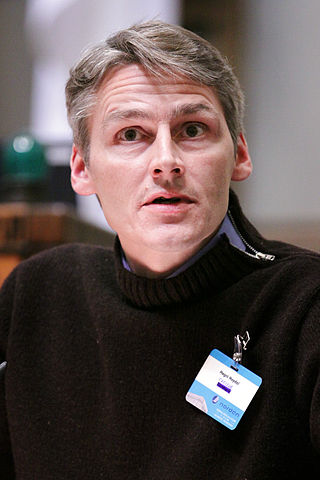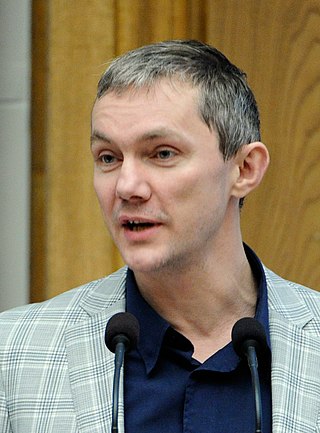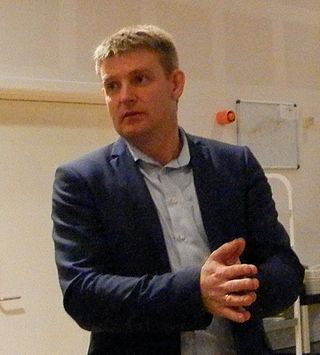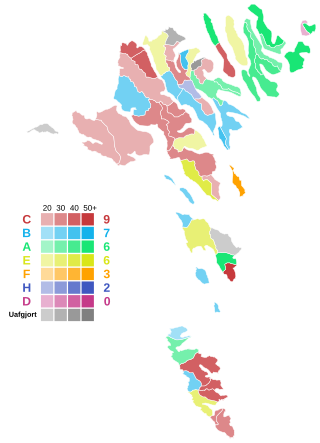The politics of the Faroe Islands, an autonomous country of the Kingdom of Denmark, function within the framework of a parliamentary, representative democratic dependency, whereby the Prime Minister of the Faroe Islands is the head of government, and of a multi-party system. The Faroe Islands are politically associated with the Kingdom of Denmark but have been self-governing since 1948. Executive power is exercised by the government. Legislative power is vested in both the government and the Løgting. The judiciary is independent of the executive and the legislature and the responsibility of Denmark. As of October 25, 2007, the Faroe Islands became one electoral district.

The Folketing, also known as the Parliament of Denmark or the Danish Parliament in English, is the unicameral national legislature (parliament) of the Kingdom of Denmark—Denmark proper together with the Faroe Islands and Greenland. Established in 1849, until 1953 the Folketing was the lower house of a bicameral parliament, called the Rigsdag; the upper house was Landstinget. It meets in Christiansborg Palace, on the islet of Slotsholmen in central Copenhagen.

The Løgting is the unicameral parliament of the Faroe Islands, an autonomous territory within the Danish Realm.

Jóannes Dan Eidesgaard is a former Faroese politician. He was the Prime Minister of the Faroe Islands from 2004, starting shortly after the general election of 20 January 2004, until 26 September 2008, when a new coalition took office. He served as Finance Minister from 1996 to 1998 and again from 2008 to 2011. He was a member of the Danish Folketing representing the Faroe Islands from 11 March 1998 until 20 November 2001.
Sjálvstýri is a liberal, autonomist political party on the Faroe Islands. It is currently led by the Mayor of Klaksvík, Jógvan Skorheim.

The Union Party is a conservative-liberal, agrarian political party on the Faroe Islands. The party wants to maintain the Faroe Islands' union with Denmark. On 24 October 2015 Bárður á Steig Nielsen succeeded Kaj Leo Johannesen as party leader.

Høgni Karsten Hoydal, commonly called Høgni Hoydal, is a Faroese politician. He currently serves as Deputy Prime Minister of the Faroe Islands and Minister of Foreign Affairs and Trade. He has been the party leader of Tjóðveldi since 1998.

The Social Democratic Party is a social-democratic political party on the Faroe Islands, led by Aksel V. Johannesen.

The Faroese People's Party – Radical Self-Government is a pro-Faroese independence conservative and conservative-liberal political party on the Faroe Islands led by Beinir Johannesen. One of the four major parties, it has had eight seats in the Løgting since the 2019 election, making it the joint-largest party, but it has neither of the Faroes' seats in the Folketing.
Same-sex marriage in the Faroe Islands has been legal since 1 July 2017. Legislation allowing same-sex marriage and adoption by same-sex couples was approved by the Løgting on 29 April 2016. The Danish Parliament approved the necessary legislative adaptations on 25 April 2017, and the law received royal assent on 3 May and went into effect on 1 July 2017.
Early general elections were held in the Faroe Islands on 29 October 2011. Faroese law states that new elections must be held at least once every four years; however, either the Prime Minister (Løgmaður) or a majority of the members of the Faroese Parliament may call an election before the end of this period. The previous elections having been held on 20 January 2008, the latest date on which the next elections could have been held was 19 January 2012. However, the Prime Minister of the Faroe Islands, Kaj Leo Johannesen, announced on 27 September 2011 that elections would be held on 29 October 2011. He gave no particular reason for his decision.

Progress is a liberal, pro-Faroese independence political party on the Faroe Islands.

Sjúrður Skaale is a Faroese politician, journalist, actor, singer, and comedian. He is a member of the Folketing for the Social Democratic Party. From 2008 to 2011 he was a member of the Løgting.

Aksel Vilhelmsson Johannesen is a Faroese lawyer and politician for the Social Democratic Party (Javnaðarflokkurin) and the current prime minister of the Faroe Islands and also served as prime minister from 2015 to 2019. He is a former footballer.
General elections were held in the Faroe Islands on 1 September 2015. Elections for the Danish Folketing were held beforehand on 18 June.
Sonja J. Jógvansdóttir is a Faroese journalist, politician, and establisher and coordinator of Samtak, the Faroese trade union center. Until 2015, she was a member of Social Democratic Party (Javnaðarflokkurin). She is a spokesperson for the rights of homosexual people and their rights in the Faroe Islands and was one of the establishers of LGBT Faroe Islands in 2011.

General elections were held in the Faroe Islands on 31 August 2019. The elections resulted in the defeat of Aksel V. Johannesen's coalition government consisting of the Social Democrats, Republic, and Progress. Following the elections, a new coalition government was formed by Union Party leader Bárður á Steig Nielsen, consisting of the Union Party, the People's Party and the Centre Party, which won 17 of the 33 seats.

Early general elections were held in the Faroe Islands on 8 December 2022. The opposition Social Democratic Party led by former Prime Minister Aksel V. Johannesen emerged as the largest party, receiving the largest vote share of any party since 1990, while Self-Government lost its Løgting representation for the first time since 1945.













